Plextor M6S & M6M (256GB) Review
by Kristian Vättö on April 10, 2014 6:00 AM ESTRandom Read/Write Speed
The four corners of SSD performance are as follows: random read, random write, sequential read and sequential write speed. Random accesses are generally small in size, while sequential accesses tend to be larger and thus we have the four Iometer tests we use in all of our reviews.
Our first test writes 4KB in a completely random pattern over an 8GB space of the drive to simulate the sort of random access that you'd see on an OS drive (even this is more stressful than a normal desktop user would see). We perform three concurrent IOs and run the test for 3 minutes. The results reported are in average MB/s over the entire time.
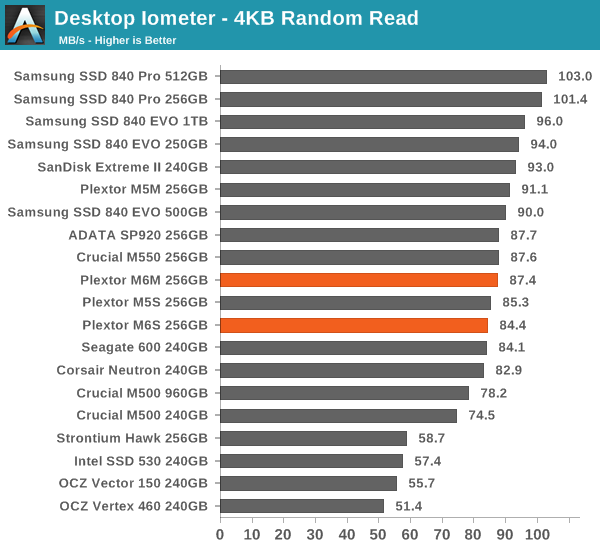
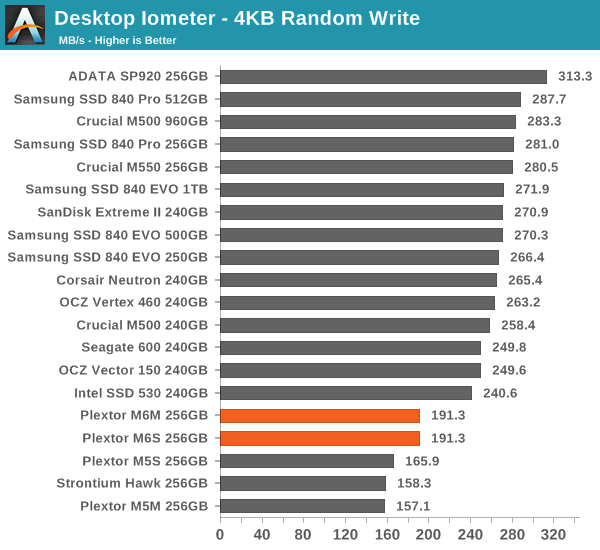
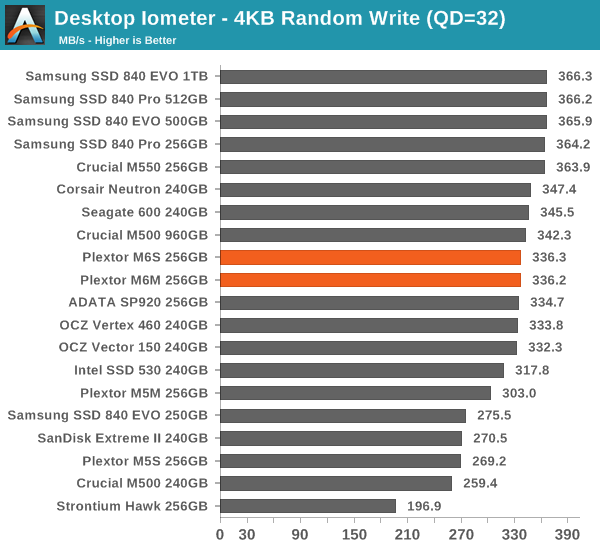
While random read speed remains unchanged from the M5 days, random write performance is nicely up. We are still not seeing very high random write performance at low queue depths but some improvement is always better than nothing.
Sequential Read/Write Speed
To measure sequential performance we run a 1 minute long 128KB sequential test over the entire span of the drive at a queue depth of 1. The results reported are in average MB/s over the entire test length.
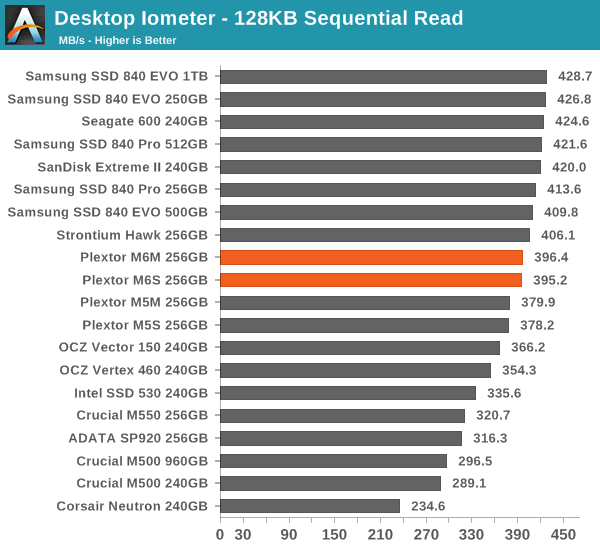
Both sequential read and write performance are up slightly compared to the M5S and M5M. Even though the improvements are rather marginal (4-13%) at least the performance is going up even though we are dealing with smaller lithography NAND and a more limited controller.
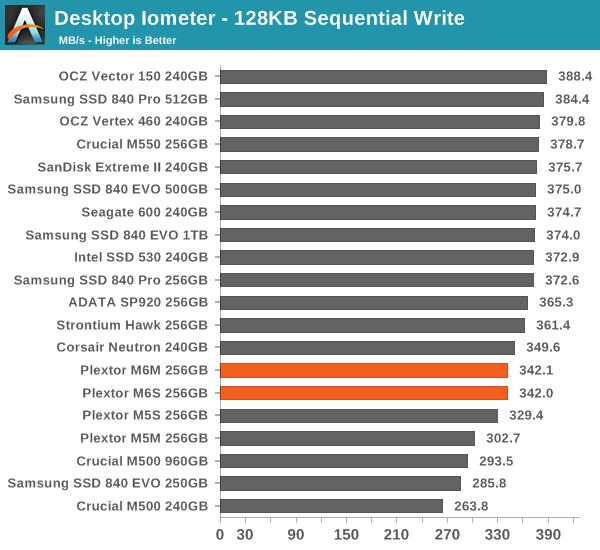
AS-SSD Incompressible Sequential Read/Write Performance
The AS-SSD sequential benchmark uses incompressible data for all of its transfers. The result is a pretty big reduction in sequential write speed on SandForce based controllers. In AS-SSD the sequential read performance actually takes a small hit, although it's could be just normal test variation. In any case, we are bottlenecked by the SATA 6Gbps interface when it comes to read performance anyway. Write performance, on the other hand, is up by up to 24%, which is rather significant.
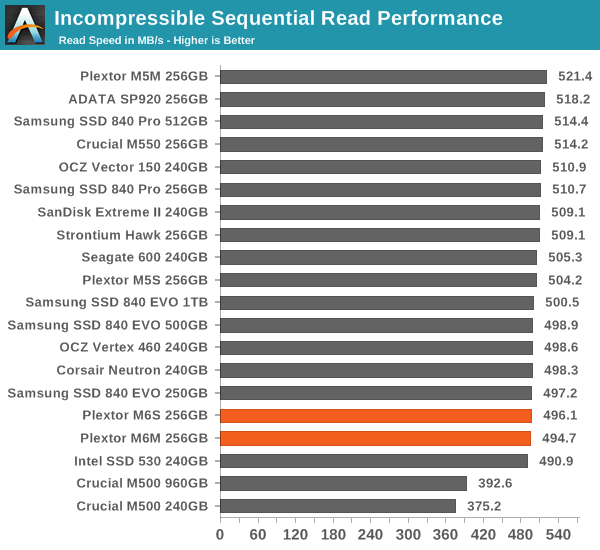
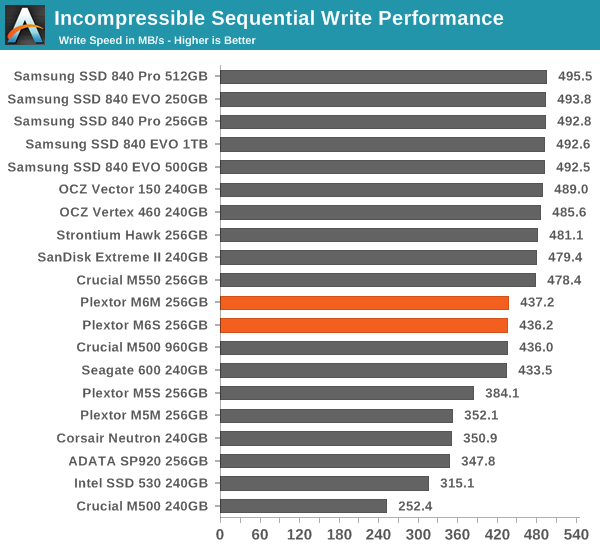










30 Comments
View All Comments
nick2crete - Thursday, April 10, 2014 - link
Christian ,the Crucial M550 has the Marvell 9189 controller ,so what are the differences from 9187,9188 and 9189
Kristian Vättö - Friday, April 11, 2014 - link
9189 is an updated version of the 9187 with full DevSleep and LPDDR support.9188 is a light version of the 9187 with four channels instead of eight.
nick2crete - Friday, April 11, 2014 - link
Thank you !maybe you should correct it in the review ,because as it is written is meant that the M550 has the 9187 or you meant the M500 probably ..
HisDivineOrder - Thursday, April 10, 2014 - link
The main reason to release a derivative product is because "the other guys" are releasing new products and you don't want to seem behind.AKA AMD re-releasing the 7xxx series as R9 parts with new branding and new "newness." nVidia, Intel, they all do it. In fact, Intel's about to do it again.
payton2037 - Sunday, April 13, 2014 - link
Start a Second Income™with the company that's first with Internet entrepreneurs!For more Details Please visit at :--
http://www.sfi4.com/14161637/FREE
watersb - Monday, April 14, 2014 - link
Fantastic overview of NAND drive internals. Bundle this up as an Amazon Single for $1.99 and take my money.AbRASiON - Wednesday, April 16, 2014 - link
Would I be right in assuming when the author writes "manufacturers are preparing for the PCI-e era" regarding SSD storage, we're looking at that NGFF or whatever it is, next gen mSATA port? I mean surely they don't expect us to blow a PCI-e port on storage? (I would if it was worth it, most wouldn't)Antronman - Monday, April 21, 2014 - link
PCIe storage already exists at the consumer level...Extremely expensive, 1.4TB Read 700MB Write PCIe SSDs.
420GB, 1500USD.
Ultraspark - Thursday, April 24, 2014 - link
On Amazon Plextor m5p 128gb cost about 117$, and not 200$. I wonder how did you found such price. Or on newegg prices are updated once per 2 year, or this is an cheap review "paid" by someone to put Plextor in a bad light. It is well known that the controller+memory tandem is a half job. The firmware do the other half of job. You'll never feel in real life few tens of Mbps or few thousands of IOPS. The main goal of plextor is reliability! Just remember the Sandforce devices with shitty firmware who die like no one else. The MxS series is a preparation for MxP series. Remember the new revision of M5S. It is almost M5P with very small difference, without a chance to feel that difference in real life. Just different firmware and case. So, let's be honest dear reviwer: a good car is just a half job. If you want to win you need a good driver. The same is with plextor. This is 1st firmware. It is just to work. The future firmwares will do the magic, like on M5 Series. And When you search for price, be honest to search for lowest, not for highest. Please correct from 200$ to 117$Ultraspark - Thursday, April 24, 2014 - link
Or change the supplier. I never buy from newegg.